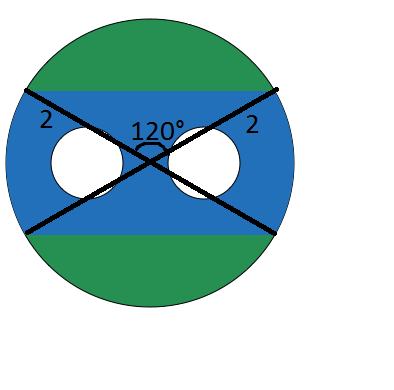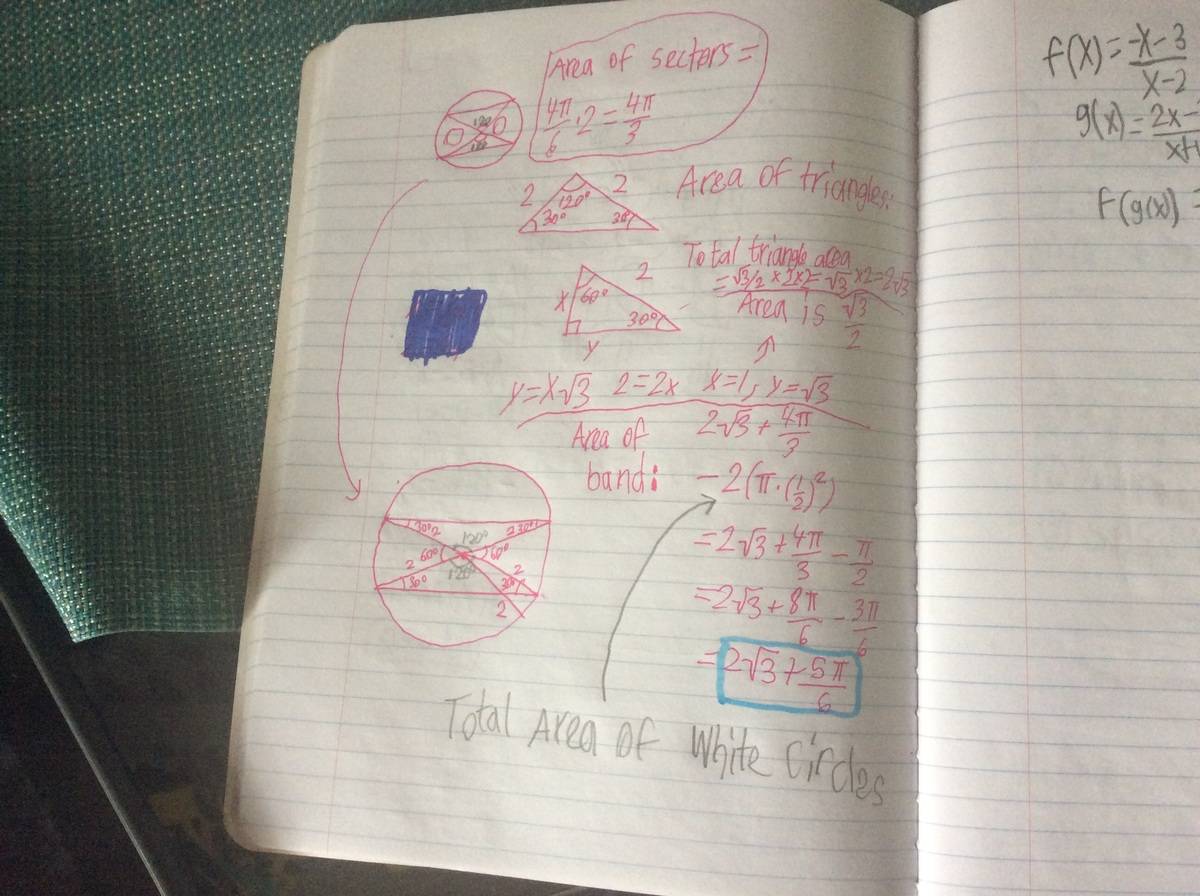Ninja Turtle!
When sketching out Leonardo Da Turtle, I started out with a green circle of radius 2, and then added a blue band across his eyes. The circular arcs of the blue band each subtend an angle of 60 degress at the center. And 2 triangles to fill in the gap. Finally, I added eyes of diameter 1.
What is the (visible) area of the blue band?
This section requires Javascript.
You are seeing this because something didn't load right. We suggest you, (a) try
refreshing the page, (b) enabling javascript if it is disabled on your browser and,
finally, (c)
loading the
non-javascript version of this page
. We're sorry about the hassle.
5 solutions
Hey buddy the angle is 60 degrees not 30. Might be a tempo but just saying.

We can divide the blue band into two congruent sectors and two congruent triangles by drawing two diameters as shown above.
Area of sector = 3 6 0 6 0 × π ( 2 ) 2 = 3 2 π
There are two of these so the area of both the sectors combined is 3 4 π
Area of triangle = 2 1 × 2 × 2 × sin 1 2 0 ° = 3
There are two of these so the area of both the triangles combined is 2 3
So the area of the blue band is 3 4 π + 2 3
Now we have to subtract the areas of the two smaller circles.
Area of smaller circle = π ( 2 1 ) 2 = 4 1 π
There are two of these so the area of both the smaller circles combined is 2 1 π
So the area of the visible blue band is 3 4 π + 2 3 − 2 1 π = 6 5 π + 2 3
Great thanks!

I solved without using trigonometry.
Blue area = Large circle - 2 green segments - 2 white circles
= 4π - 2(4π/3 - √3) -π/2
= 5π/6 + 2√3
Area of 2 sectors = (πr^2)/3 since 60 degrees sector. Area of small circles (eyes) = 2 x π x (1/2)^2 = 1/2π Area of 2 triangles = 2*sqrt(3). Use trigonometry. Visible Blue Area = 4/3π-1/2π +2/3 = 5/6π + 2/3
Can you provide a Detailed Solution? Or possibly a solution without Trigonometry?
Log in to reply
Area of each of the two 6 0 o s e c t o r s = 6 π ∗ 2 2 . Each of the two triangle fill in the gap are 30-60-90 right angled, with the hypotenuse= 2. So area of each is 2 1 ∗ 1 ∗ 3 . . So half blue area + an eye = 6 π ∗ 2 2 + 2 ∗ 2 1 ∗ 1 ∗ 3 ∴ H a l f t h e r e q u i r e d a r e a = a b o v e h a l f a r e a − a n e y e = 6 π ∗ r 2 + 2 1 ∗ 1 ∗ 3 − π ∗ ( 2 1 ) 2 = 1 2 5 + 3 .
Log in to reply
Another way to deal with the 2 triangles is to notice that when you combine them along their longest end, you get 2 equilateral triangles.
Log in to reply
@Chung Kevin – Thanks. It is a simpler way than mine.
Log in to reply
@Niranjan Khanderia – I must report to this question since no triangle was made earlier
How do you get from a 30-60-90 triangle with hypotenuse of 2 to area of 1/2 * 1 * 3^1/2 ?
A = 2 ( 3 6 0 3 0 ) ( π ) ( 2 2 ) + 2 ( 2 1 ) ( 2 ) ( 2 ) ( sin 1 2 0 ) − 4 π ( 1 2 ) = 3 4 π + 4 ( 2 3 ) − 2 π = 3 4 π + 2 3 − 2 π = 6 5 π + 2 3
Notes:
area of a circular sector = 3 6 0 θ π r 2 where θ is the central angle and r is the radius
area of a triangle = 2 1 a b sin C where a and b are two adjacent sides and C is the included angle
area of a circle given diameter = 4 π d 2 where d is the diameter.
sin 1 2 0 = 2 3